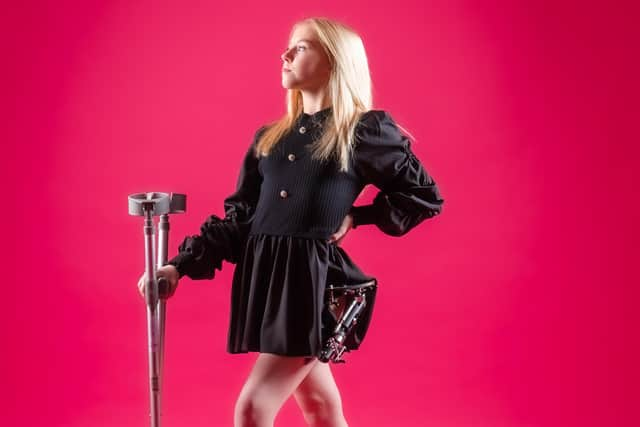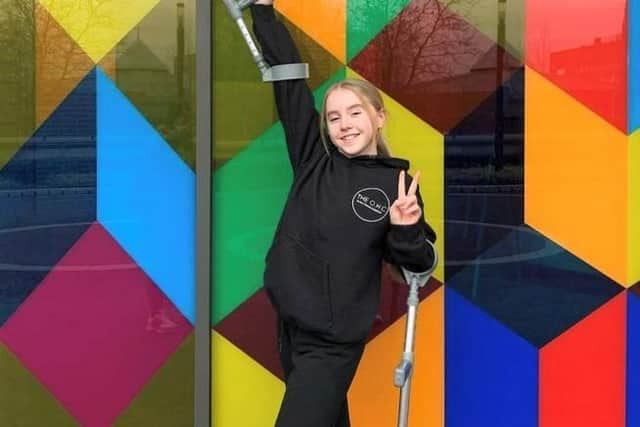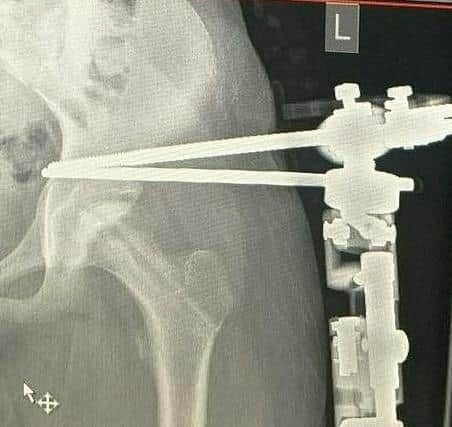Legg-Calve-Perthes disease: Mia’s treatment at Sheffield Children’s is helping her get back on the dancefloor
and live on Freeview channel 276
Mia has been dancing since she was four years old, first doing ballet and tap, then competing in regional competitions. She is now part of an elite team and practices over 11 types of dance – jazz, acro and contemporary are her favourite.
However, last year this all came to a halt when Mia developed pain in her left hip and a limp.
Advertisement
Hide AdAdvertisement
Hide AdAfter her symptoms worsened, an X-ray at her local A&E in Lancashire revealed Mia had late-onset Perthes’ disease. She was told to stop dancing for the time being.


Legg-Calve-Perthes disease, known as Perthes’ disease, is a condition which affects the hip joint in children. It’s where part or all of the femoral head – the ball part of the ball-and-socket hip joint – loses its blood supply, causing the bone to soften and break down.
Perthes’ disease is rare, affecting around 1 in 10,000 children, and we do not currently understand why it occurs. It is more common in children younger than Mia, usually affecting those under the age of 10, and is more prevalent in boys than in girls.
Mia’s mum, Amanda, said: “Mia wants to be a professional dancer, so I knew we had to get her the right care. I watched lectures and read lots of papers to try and work out what treatment she would need.”
Advertisement
Hide AdAdvertisement
Hide AdTreatment for Perthes’ disease depends on the severity of the disease and may include physiotherapy, crutches, or plasters. Sometimes, an operation to re-shape the bone around the hip joint is needed.


In Mia’s case, due to her older age, this surgery was required. An external fixator would need to be fitted to her hip and the top of her leg for four months to relieve pressure on the femoral head, allow for healing and increase the blood supply to the hip.
Amanda said: “At first I thought we’d have to visit a doctor I’d found in Portugal for the surgery, until I put a question in a Perthes’ disease group on Facebook. I asked if anyone had got an external fixator fitted in England and another parent replied to recommend Mr James Fernandes, a consultant orthopaedic surgeon at Sheffield Children’s.”
Mr Fernandes specialises in limb reconstruction at Sheffield Children’s, and is part of the hospital’s world-class Paediatric Limb Reconstruction Service. Children and young people come from across the UK and around the world for this specialist care.


Advertisement
Hide AdAdvertisement
Hide AdIn November, Mia visited Sheffield Children’s Hospital to prepare for surgery in December. At the pre-operation assessment, she met Mr Fernandes, physiotherapists, anaesthetists, occupational therapists, the Pain Management Team and the Limb Reconstruction Team.
Amanda said: “Everybody came to see us; it was so organised. After the surgery we stayed on Ward 2 for six days. The staff at Sheffield Children’s couldn’t do enough and we felt like all the pressure and weight had been taken away. Even afterwards, I know I can give them a call if I have anything worrying me. Nothing is too much trouble for them.”
Mia has since been recovering from her operation, attending the hospital for check-ups, doing daily physiotherapy exercises and using crutches and a wheelchair to help her get around.
With huge support from her teachers and fellow dancers at McLaren Dance Company, Mia has even been back at the studio adapting dance routines using just the upper half of her body while sitting on a chair.
Advertisement
Hide AdAdvertisement
Hide AdMia is having a second operation this week to remove the fixator, after which, the healing process can take up to two years.
Amanda added: “A lot of people dismiss Mia’s dancing and don’t understand that it can be a career. But Mr Fernandes understood and listened to us – we showed him videos of Mia dancing and he showed us clips of people dancing in India after similar treatment.”
